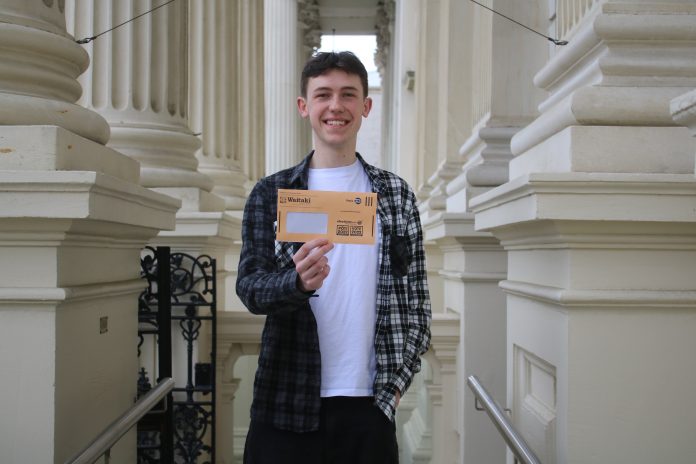
‘‘Right here, right now is our opportunity to be paving that path for our future.’’
As Ethan Reille voted in Waitaki’s local body elections for the first time, the opportunity was not lost on him. The Waitaki Boys’ High School head boy and youth leader said it was a ‘‘surreal’’ experience to cast his vote.
‘‘Obviously it’s an experience for the first time that I won’t ever have again,’’ the 18-year-old said.
‘‘It shouldn’t be such a big deal that a young person is voting . . .because at the end of the day it is their right to vote and it’s their right to have their voices heard.’’
In New Zealand, 430,595 18 to 24›year›olds are eligible to vote, but only 279,857 are enrolled. In Waitaki, 1074, or 76%, are enrolled from that age group, compared to neighbouring districts Waimate, with 326, or 68.34%, and Mackenzie, with 262, or 66.33%.
Voting gave residents the opportunity to have their say on who will represent them in the council chambers for the next three years and Ethan said it was important young people had a vested interest in the election.
‘‘It’s important to let [youth] know that their voices are important and are equally as important as anyone else in the district.
‘‘We are the future. We are the future of this district whether we stay here or we go away and come back.’’
Asked if there was enough information for youth regarding local elections, Ethan said ‘‘absolutely not’’.
Many were unaware there was an election, did not know who the candidates were, how to enrol or vote and it was a ‘‘daunting space’’ to be in, he said.
Others did not understand the difference between a general and local election — Ethan had friends asking if people were voting for Waitaki National MP Jacqui Dean for council.
More education in schools, from community members and youth forums regarding voting was needed, he said.
‘‘This is going to be their first time voting, so we need to be going the extra mile to be encouraging them, because then their chances of voting again is extra likely, and they are the next generation. We want to be hearing of a future that supports young people.’’
It was important to spark the interest in issues for young people, and the community had an obligation to provide that pathway, Ethan said.
But he also knew it was a ‘‘two-way street’’.
‘‘It’s about meeting in the middle. It’s up to the older generations to be seeking those conversations, but it’s also up to young people to be engaging as well.’’
Waitaki District Youth Council deputy chairwoman Mady Rawson (18) is also voting for the first time and called it a ‘‘great privilege’’.
‘‘I would like to think that I had a say in whose hands the future of Oamaru lies in,’’ Mady said.
She echoed Ethan’s comments regarding a lack of information for youth voting — many thought it was an ‘‘adult thing’’.
‘‘Although there is a sufficient enough amount of information circulating in the Waitaki district, young people do need more support regarding the voting process and what the vote really means to them.’’
Council chief executive Alex Parmley said there were many council issues affecting youth, including climate change, community inequality and health, and it was important they voted so the council could meet their needs.
However, it was disappointing almost a quarter of Waitaki’s youth were not enrolled.
‘‘We should all be emphasising the importance of everyone enrolling to vote and then voting in elections, especially our young people. We need our young people to be heard,’’ Mr Parmley said.
The council ‘‘worked hard’’ to provide information for youth, including visiting local secondary schools to encourage voting, providing teachers and schools with voting resources, presenting to the youth council and running a video competition on why it is important to vote.
‘‘Whilst if we had unlimited resources there is always more [that] could be done.’’
Those not enrolled can still fill out a special vote at the council building. Council staff will also visit Omarama, Otematata, Kurow, Waihemo and the Oamaru Farmers’ Market regarding special voting. Voting closes on October 8.



